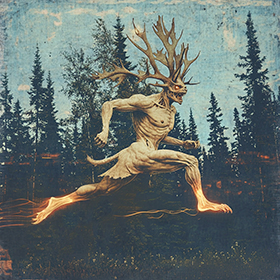
Wendigo
 In Algonquian Tradition
In Algonquian Tradition
"Wendigo is a mythological creature or evil spirit originating from Algonquian folklore. . . The wendigo is often said to be a malevolent spirit, sometimes depicted as a creature with human-like characteristics, which possesses human beings. It is said to cause its victims a feeling of insatiable hunger, the desire to eat other humans, and the propensity to commit murder. In some representations, the wendigo is described as a giant humanoid with a heart of ice, whose approach is signaled by a foul stench or sudden unseasonable chill. . . Although descriptions can vary somewhat, common to all these cultures is the view that the wendigo is a malevolent, cannibalistic, supernatural being. They were strongly associated with winter, the north, coldness, famine, and starvation. Basil H. Johnston, an Ojibwe teacher and scholar from Ontario, gives a description of a wendigo:
'The Wendigo was gaunt to the point of emaciation, its desiccated skin pulled tightly over its bones. With its bones pushing out against its skin, its complexion the ash-gray of death, and its eyes pushed back deep into their sockets, the Wendigo looked like a gaunt skeleton recently disinterred from the grave. What lips it had were tattered and bloody ... Unclean and suffering from suppuration of the flesh, the Wendigo gave off a strange and eerie odor of decay and decomposition, of death and corruption.'
In Ojibwe, Eastern Cree, Westmain Swampy Cree, Naskapi, and Innu lore, wendigos are often described as giants that are many times larger than human beings, a characteristic absent from myths in other Algonquian cultures." [Wendigo, Wikipedia]
In Blackwood
Algernon Blackwood's story "The Wendigo" draws inspiration from the Algonquian legend but contributes unique characteristics. In the story, the Wendigo is a sort of great animal that lives up northwards in Canada, quick as lightning in its tracks, bigger than anything else in the Bush, and not very good to look at. It has a extraordinary odor, pungent and acrid like the odor of lions. Several Indians saw the Wendigo along the shores of Fifty Island Water. When an Indian goes crazy, it's always said that he's seen the Wendigo. It has large, round footprints that become further and further apart (up to 18 feet apart) and develop glowing red edges when it runs quickly, and then disappear altogether when it runs across the treetops or perhaps ascends into the sky. The Wendigo is said to burn its feet—owing to the friction caused by its tremendous velocity—till they drop off, and new ones form exactly like its own. Its diet is moss. It summons its victim by calling his name in a windy, crying voice. The victim then feels compelled to run through the forest beside the Wendigo, going faster and faster until his eyes bleed and his feet burn, until finally taking to the air. Later the Wendigo drops its victim from a great height. The victim Joseph Défago survived the fall, but seemed greatly changed, as if inwardly he had become something black and diabolical, and his feet were huge and distorted. After being taken by the Wendigo a second time, and found again later, he had become meek, broken, and shrunken, with bloodstains under his eyes and feet that were normal, but terribly frozen. He had a compulsion to eat moss. He died within a few weeks. [AHB Wendigo (online text)]
In Derleth Stories
In north country Indian legends, a monstrous, supernatural being, horrible to look upon, the haunter of the great forest silences. Josiah Alwyn and Tony Alwyn thought the Wendigo had some connection with the air elementals. [AWD Beyond2]
Josiah Alwyn said that Ithaqua was worshipped as the Wendigo by certain Indians in upper Manitoba [Beyond2]. Laban Shrewsbury saw parallels between Ithaqua and the Wendigo [Curwen, Keeper]. Marius Phillips read in old books that the Wendigo was a cousin of Ithaqua [Seal (online text)].
Mr. Williams read in an archaic English translation of the Necronomicon that Wendigo and Ithaqua were involved in a plan to dominate earth [Witches].
The forest surrounding the abandoned lodge at Rick’s Lake, Wisconsin, was associated with the Wendigo [Dweller].
Winfield Phillips, on seeing an Antarctic bas-relief of Cthulhu, speculated that it was intended to be an image of the Wendigo; however, Seneca Lapham dismissed the comparison [Lurker].
Aka: Windeego.
Return to Cthulhu Universalis Contents Page
Return to CthulhuFiles.com Home Page
Send comments to jfm.baharna@gmail.com.
© Copyright 1996-2025 by Joseph Morales
